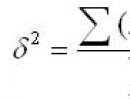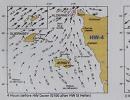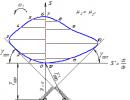Poems of different years. Andrey Novikov. Days of Remembrance Our fellow countryman now "rules" Lipetsk literature
Andrey Korovin and Alexander Pereverzin remember their poet friend. Photo by Andrey Tarasov
This year, Andrei Novikov, a poet, editor of the Modern Poetry magazine, an employee of the Art House Media publishing house, the organizer of the Word Order festival, the creator of the Litafish website, died ...
An evening in his memory and a presentation of the posthumously published book The Unthinking Heir were held at the Bulgakov House. The book is dedicated to Lilia Gazizova, the last beloved woman of Andrey Novikov.
The evening was hosted by the permanent curator of the Bulgakov House and good friend Novikov Andrey Korovin. The first to speak was Olga Ermolaeva, who lamented that "the sweet face of Andryusha is missing." She also called Andrei a mentor, a teacher, on whose recommendation many were published, who then took a prominent place in modern poetry. Olga Ermolaeva shared her observation that recently Andrey looked discolored, and earlier he could easily tumble in the snow. And she was glad that at the end of her life, love came to Andrei with the beautiful name Lilia.
Then came Alexander Pereverzin, editor-in-chief of the Voymega publishing house, which published the book. He told how this collection of Andrei's poems was created - perhaps his only book in general. The fact is that Andrei was not inclined to publish his poems, he treated them without due attention, not seriously. He was always ready to cede publication to someone else.
Then Andrei's friends - Vyacheslav Kharchenko, German Vlasov, Konstantin Prokhorov, Vladimir Pimenov and others, spoke about what Andrei was like in life. Everyone agreed that he was a cheerful, sociable person, kind, generous, sympathetic, well-read, intelligent, well versed in poetry ... You could always come to visit him, he always gave on credit, left for the night, if necessary, helped everyone to print ...
Almost all the speakers began their speech in bewilderment with the fact that they didn’t know what to say ... But they grieve just like everyone else, and they also remember with a kind word, and everyone misses him, and through one they believe that Andrei is still alive. And Andrei's mother also believes that her son is alive.
Andrei died absurdly ... Almost everyone has recently noticed that Andrei has moved away from everyone, and it has become noticeable that something difficult, bad is happening in his soul. Andrey went missing, and they found him already buried ... Therefore, I really want to believe that it was not Andrey who was actually buried. He deceived everyone and left in a different way.
Mikhail Kvadratov said that "Andrey was good, big, round."
Yuri Konkov, perhaps, said it best of all: "He was in poetry, all, entirely, always, and she flowed in her veins instead of blood."
Lilia Gazizova knew Andrei better than everyone present, but she was not inclined to revelations, because the wound still had not healed, and the poetess could hardly hold back her tears. She read a poem that ended like this: "But by dawn you come to life again and stroke my hair."
I would like to finish with a quote from Andrey's published book: "... only the memory will not die / will not cool down / look at the sky / it is not blue"
IN Blessed Memory Andrey Novikov
A remarkable person, publisher and poet Andrei Novikov (1974-2014), died.
When this happened, I was abroad, I could not immediately respond, I could not take part in the funeral ceremony, memorial evenings.
And I have something to say. We've known each other for ten years.
Andrew was a man the highest degree worthy, selflessly loved poetry and poets, published many books, issues of the journal "Modern Poetry" (at one time I printed it), he wrote poetry himself, but he never, which is completely unusual, did not promote himself. I remember his single publications, in particular, in Literaturnaya Gazeta.
Together with Andrei, we published several books, for example, poems by Anna Logvinova. He financed the book, and my West-Consulting publishing house did the layout, layout, and we printed the collection.
And then this book received the prestigious Moscow Account award. Evgeny Abramovich Bunimovich presented us (the publishers) with an honorary diploma. And Andrey is generous! - gave this diploma to me, although he had no less rights to it than I did. In the end, whoever pays orders the music.
One day Andrew and I had a fight. On the pages of FB, he spoke unflatteringly and rudely about my writing. He probably wrote everything correctly and fairly, but, of course, it was unpleasant for me.
Literally two weeks later, Andrei himself approached me during a buffet table, which took place after the presentation of the Delvig Prize, and publicly apologized to me. We hugged like brothers. And they never fought again.
Just like that - kind, noble, generous and very talented! - I remember Andrei Novikov.
Eternal memory to him!
Today we publish poems from the creative heritage of the poet.
Evgeny STEPANOV
Andrey NOVIKOV
POEMS OF DIFFERENT YEARS
Green Pushkin
Spring again.
The days themselves wanted to live longer,
Moving further away from us
Sadness.
On Pushkin Square suddenly
Bloomed monument
Where people meet.
Woke up from hibernation
Laughing, looking up at the sun
Fragrantly swollen
Green tender buds,
rustled,
And above him
Dazzling sky silk
Flashed back.
And magical kaleidoscope
The picture is crumbling
He just shakes
Curly green mane.
And people stare in amazement
And eagerly
This marvelous marvel is drunk.
And the sun above it
shines
And gives the world
Peace.
What a world
Do not dream, do not introduce yourself,
While you wait impatiently
Favorite.
"I crossed my legs,
Velimir is sitting. He's alive."
Kharms
He has been disturbing the mind for more than a century
and guards.
Life will be stricter with you
but you have to live.
And the world that he visibly built,
stands like Rome.
As if three invisible
are following him.
The sun served him
and bread and blood.
And were a joyful catch
good, love.
All his belongings, clothes, utensils -
Paper bag.
And he got up from the grass in the morning
And went on.
Like a careless heir
opening sesame,
he lived every day like the last,
and died himself.
Slava Kharchenko
Someone was crucified with lead on the wall
When snowstorms covered the country.
For some reason this December snow
It was blacker than the earth itself.
And the wind took someone else's without shame,
People lost fingers and hands.
But there were no those who wanted to cry,
Everyone wanted to play the game.
And joy baptized the world with a grin,
Immersed in the troubles of their gods,
who used to be people
But no one remembered that.
The sky, screwing up a gypsy eye,
I stole the stars to hide the picture,
How they filmed at night secretly from a stake
The corpse of someone who was a stranger to the game.
Only the New Year will subside
The Slavs will meet
First holiday of the year.
Morning confusion
The belfry of the streets will burst,
Bad dreams will pass.
The quiet court will be indignant;
Through the windows of my room
You can see the whole celebration:
How, surrounding the hospital,
Trees in white coats
Celebrate Christmas.
acrosonnet
Summer with you starts in February.
Frost on the windows, trees in sheepskin coats.
Light colors - early winter watercolor.
Even the cold seems to be on the wane.
Your name is purple, your bangs are red.
You look with brown eyes - a gentle whirlpool.
And then - one dawn with you to breathe.
Know that it cannot be otherwise.
And like spring, lilacs are pouring from the bushes.
The heat portends a hot summer of fun.
The hoop of the months sends its dots and dashes...
Time can take nothing away from us!
In the autumn we will also walk in silver.
And kiss with relaxed lips.
The publication was prepared by Lilia GAZIZOVA
Andrey Novikov (1974— 2014) - Poet, editor He was the editor-in-chief of the journal "Modern Poetry", the head of the Internet portal "Literary Poster".
“Respect for the past is the feature that distinguishes education from savagery” (A.S. Pushkin)
H Ovikov Andrey Vyacheslavovich
— Lipetsk poet and prose writer from the Bezhetsk region

Novikov Andrey Vyacheslavovich- was born in 1961 in the Tver region. Graduated from the Literary Institute. Gorky (seminar by V. Kostrov).
Author of two poetry books. Published in Literaturnaya Gazeta, Moskovsky Komsomolets, Literary Studies, Friendship, Young Guard, Rise, Student Meridian, Literary Kyrgyzstan almanacs, Day of Poetry, Poetry almanacs , "Sources", numerous collective collections of Moscow and Voronezh. He was noticed by the famous critic Vladimir Slavetsky, who wrote about the author in two of his books (“Letters with a Continuation”, “Russian Poetry of the 80–90s of the 20th Century”) and several articles. Member of the Union of Writers of Russia (adopted in 1989 at the 9th All-Union Conference of Young Writers, ticket of the Union of Writers of the USSR, signed by the famous prose writer Timur Pulatov)
In 2015, Andrey Novikov headed the Lipetsk regional branch of the Writers' Union of Russia. According to the information portal LipetskMedia, the new chairman was elected at a board meeting public organization writers. Andrei Novikov is 53 years old. He considers his main tasks in this position to be the strengthening of the ranks of the writers' organization, the implementation of new projects within the framework of the Year of Literature.
Andrey Vyacheslavovich says about his ties with the Bezhetsk land: “I am completely connected with Bezhetsk and the Tver region, all my relatives on my father’s and mother’s side live in Bezhetsk, Zaluzhane (near Molokovo) and Tver, my parents retired and returned to the Tver region. .."
Our fellow countryman now "rules" Lipetsk literature
The branch of the Writers' Union in Lipetsk was headed by the Upper Volga writer, a native of Bezhetsk, Andrey Novikov

Poet, prose writer and journalist Andrei NOVIKOV received this appointment in April 2015. THIS notable modern writer was born on December 26, 1961 in the village of. Alabuzino, Bezhetsky district, Tver region. His childhood was spent in Lipetsk, where he graduated from high school. After serving in the army in the Baltic Military District, he entered the Literary Institute named after A.M. Gorky at the Faculty of Poetry (seminar by V. Kostrov and V. Milkov) and in 1990 he defended his diploma with honors.
After graduating from the institute, he worked as a correspondent, executive secretary in the newspapers Lipetskiye Izvestiya, Lipetskaya Gazeta, Provincial Reporter, special correspondent for RIA Novosti in the Lipetsk region, editor-in-chief of the Gorod Lip newspaper.
His first serious literary publication was in Podyom magazine in 1984. Poems by A.V. Novikov were published in district, regional and central newspapers. In 1988, he published his first poetry collection "Among herbs" in Voronezh. A year later, A. Novikov, on the recommendation famous poet Nikolai Starshinov became a participant in the 9th All-Union Conference of Young Writers (V. Prokushev's seminar), where his poems were highly appreciated. In 1992, Novikov was admitted to the Writers' Union of Russia.
Andrey Novikov's poems belong to the category of intellectual poetry. His poetic works and prose stories are constantly published in the literary magazine "Petrovsky Bridge", the magazine "Rise", were included in the book "Writers of the Lipetsk Territory. Anthology. XXI Century".
Andrei Vyacheslavovich granted the right to publish part of his work on the site "Bezhetsky Krai". Readers of the site will be interested to get acquainted with the work of this original and talented author, a native of the Bezhets land.
Historical, cultural and local lore site "Bezhetsky Krai"
BEZHETSKY REGION
The materials posted on the local history site "Bezhetsky Krai" serve educational and enlightening purposes, are intended to promote humanitarian knowledge, popularize the authors' creativity. The posted materials are free for non-commercial use and are not intended for any use on a paid basis. Changing the author's texts is unacceptable, when using the materials of the site, a link to the authors of the materials and the site "Bezhetsky Krai" is required.
The site administration will gratefully accept all comments and suggestions regarding the operation of the site, will do everything possible to ensure that the proposed materials and information are interesting and informative for site visitors, do not violate copyright and legitimate interests of third parties, and comply with current legislation and ethical standards.
Novikov Andrey Nikitich (Nikitovich) - prose writer, journalist.
Born into a poor peasant family. He started his “universities” as a shepherd boy. Studied at rural school(according to other sources, Novikov taught the village deacon to read and write). Then he was a digger, woodcutter, loader. Called to the real military service, he “worked out” the war against the Teutons as a private (initially - in the 2nd Army of General A.V. Samsonov, participated in the inglorious campaign in East Prussia in August 1914). In March (according to other sources - June) 1917 he joined the RSDLP (b). After October, Novikov, a member of the regiment's soldiers' committee, was seconded to Balakovo, Samara Province. (now Saratov region). Here he is a member of the city government, becomes the first editor of Balakovo's Izvestia (1919).
In 1923-25 he worked in the editorial offices of magazines and newspapers in Voronezh ("Voronezh Commune"), Ivanovo-Voznesensk ("Working Territory"), Bryansk ("Bryansk Worker"). From the spring of 1925 he lived in Moscow. He worked in the publishing house "Krestyanskaya Gazeta" (including in the editorial offices of "Batrak", "Peasant Radio Newspaper"). Until Oct. 1931 was a member of the literary group "Pass".
Novikov's first book, the collection of novels and short stories Barsky Yard (1928), did not attract attention. Scandalous fame was brought to the writer by the satirical story “The Reasons for the Origin of Nebulae” (Krasnaya Nov. 1929. No. 2), published the following year (with the support of M. Gorky), about the triumph of bureaucracy “in one single country” ( main character, a communist, commits suicide because of this). Of particular interest to the story, written under the clear influence of Plato's "City of Gradov", are the hoax epigraphs that belonged to Novikov's longtime friend and countryman Andrei Platonov. The story was approved by the critic A. Lezhnev, who compared Novikov with J. Gashek (On the way to the revival of satire // Literary newspaper. 1929. April 22), and unconditionally rejected by V. Blum (Will satire be revived? // Ibid.). May 27). The thesis put forward by him about the objective counter-revolutionary nature of satire in Soviet conditions prompted M.A. Bulgakov to write a letter to the government (Stalin?). The discussion then held at the Polytechnic Museum “Do we need satire?” (1930) resolved the issue positively, which, however, did not affect the further actions of censorship. 6 years before that, A.K. Voronsky could not publish a similar story by N.N. Nikitin "Kol". The story was nevertheless published, but the author never mentioned it.
Feb. 1930 Novikov, as part of the Pravda brigade, made a trip to the places of "accelerated collectivization." Perceiving the arrival of the tractor in the village as a revolution in the peasant economy, Novikov openly spoke out against "excesses". None of his essays were published in the newspaper, and then published on Sat. "The racing field" was subjected to devastating criticism (More vigilance! // Literary newspaper. 1931. September 10 (before the title "V-r", i.e. V.V. Goltsev (?)); Berezov P. Under the mask // Proletarian avant-garde, 1932. No. 2, etc.). Novikov's story "Combine for Public Improvement" (October. 1931. No. 3) is devoted to the theme of the destruction of the personality in the conditions of the "great turning point" - a kind of continuation of "The Reasons for the Origin of Nebulae". Novikov's next book was The Genealogy of Many Generations (1935), consisting of The Tale of the Kamarnitsa Muzhik, written in the style of Shchedrin's History of a City and dedicated to the peasant uprising under Catherine II, a also “Chronicles of a provincial town” - about the events in Balakovo and the Chapaev brothers and a colorless story about a happy collective farm life - “Meeting at the Well”. 1936) - about the death of the Samson army in the Masurian swamps. It was this novel that AI Solzhenitsyn had in mind when he wrote in the preface to "August the Fourteenth" that before him the events were portrayed "not like that." Criticism reacted to the adventures of the "Russian Schweik" quite severely: Vl. Nikonov's article "Shifting Concepts" in "The Banner" (1935. No. 8) and "Empty anecdotes or sloppy satire?" in " Fiction"(1935. No. 10)," Military jokes "(Literary Leningrad. 1935. No. 35. August 1). The Smolensk edition of The Tale of the Kamarnitsky Peasant (1936) was the writer's last book.
In 1937-39, the journal published the Volga Novels cycle (30 days. 1937. No. 8 and 12), the anti-Stalinist parable "The Feast at the Ruler" (Ibid. 1938. No. 6; review by S. Nagorny "Hollow Weights" // Literary newspaper 1938. July 15), “At the monument” (about V.I. Chapaev), “Big Dipper”, “Linden blossom” (Collective farmer. 1939. No. 2,4,6). The manuscripts contained the large novel The Residence of the Freethinkers, the stories Kustarislova and The Last Letter (RGALI).
In 1940, Novikov was arrested (the reason is unknown; in the "Case" there is only one document - a statement by the writer N.V. Chertova in 1938 that Novikov loudly asked her in the House of Writers: "You heard that ten thousand Bolsheviks wrote a letter to Stalin with demanding an end to the repression?).
At the end of July 1941, when there were persistent rumors that the Germans were about to take Moscow, the systematic destruction of prisoners took place, and Novikov was shot. Posthumously rehabilitated after the XX Party Congress. On the occasion of the 100th anniversary of the birth of the writer in the village of Semyonovka, Paninsky district, Voronezh region, a museum room was equipped in the library.
M.D.Elzon
Used materials of the book: Russian literature of the XX century. Prose writers, poets, playwrights. Biobibliographic dictionary. Volume 2. Z - O. s. 658-660.
Read further:
Russian writers and poets(biographical guide).
Compositions:
From the unpublished story "Handicraftsmen of the word" / publ. M.D. Elzon, O.G. Lasunsky // Rise 1989 No. 10
Literature:
Elzon M.D. Andrey Novikov Materials for the bibliography Voronezh, 1973,
Korablikov Vl. Meetings with Platonov // Rise 1974 No. 6,
Nikonova T.A. In our countryside On the prose of A.N. Novikov // Philological Notes Voronezh 1995 Issue 5 P.131-139
Poet, prose writer, publicist was born on December 26, 1961 in the village. Alabuzino, Bezhetsky district, Tver (Kalinin) region. He spent his childhood in Lipetsk, where he graduated from high school No. 17. After serving in the army, he entered the Literary Institute. A. M. Gorky at the Faculty of Poetry (seminar by V. Kostrov and V. Milkov). After graduating from the institute in 1990, he worked as a correspondent, executive secretary in the newspapers Lipetskiye Izvestia, Lipetskaya Gazeta, Provincial Reporter, special correspondent for RIA Novosti in the Lipetsk region, editor-in-chief of the Gorod Lip newspaper.
The first serious publication took place in the journal Rise in 1984. Poems were published in district, regional and central newspapers: Leninskoye Znamya, Leninets, Lipetskaya Gazeta, Lipetskiye Izvestiya, Molodoy Kommunar (Voronezh), Literaturnaya Gazeta, Moskovsky Komsomolets; in the journals Student Meridian, Literary Education, Friendship, Young Guard, Literary Kyrgyzstan, Workers' and Peasants' Correspondent, Work Shift (Minsk), Chayan (Kazan); in the almanacs: "Origins", "Poetry", "Day of Poetry"; in the collective collections “Handshake” (Voronezh, 1987), “Tournament” (M., 1987), “Debut in Sovremennik” (M., 1990), “Young Guard-85”, “Tverskoy Boulevard, 25” (M ., 1990).
He published his first collection of poetry "Among herbs" in Voronezh in 1988 on the recommendation of S. Mikhalkov. A year later, he became a participant in the 9th All-Union Conference of Young Writers (V. Prokushev's seminar), at which poetry was highly appreciated. As a result of the meeting in 1990, in the “Library of the Journal” “Young Guard” a “book in a book” “Ancient Smile” (27 poems) was published with a preface by V. Kostrov. Currently, the works are published in the literary magazine "Petrovsky Bridge", "Rise", "Day of Poetry" (anniversary issue of 2016) and are included in the book "Writers of the Lipetsk Territory. Anthology. XXI century" (2015).
In 1992 he was admitted to the Writers' Union of Russia. The third book of poems "The Monkey Emperor" was published in Lipetsk in 1993. I was noticed by the famous critic Vladimir Slavetsky, who wrote about my work in two of his books (“Letters with a Continuation”, “Russian Poetry of the 80-90s of the 20th Century”) and several articles. Famous writers V. Tsybin and V. Kostrov wrote about my poems. The fourth book "Crossroads" was published in Voronezh in 2016.
Since April 2015, he has headed the regional branch of the Writers' Union of Russia. In the same year, he was awarded the literary prize of the magazine "Petrovsky Most" in the nomination "Prose and Dramaturgy" for the story "Writer Kapitankin" and a selection of stories "Wah in batter".
In 2016, he was awarded a Certificate of Honor from the Union of Writers of Russia, a Certificate of Honor from the Department of Culture and Art of the Lipetsk Region, and the Great Gumilyov Silver Medal "For loyalty to the creative traditions of the Silver Age".






